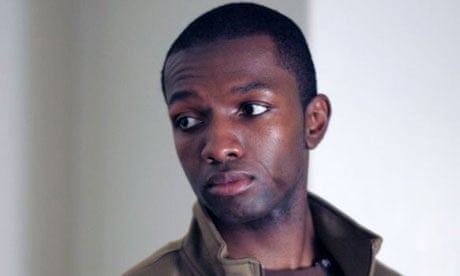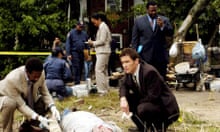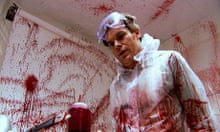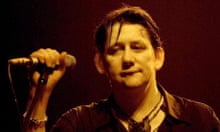From the vast cast of characters that lived in David Simon's recreation of Baltimore, there was a favourite for everyone: Bunk's honesty and humour, Omar's unique brand of gangsterism, Stringer Bell's style, Bubbles' good cheer in the face of adversity. But Marlo Stanfield was not a character to elicit much love.
In the latest of our Wire blogs written by you, the readers, stupidmansuit (aka Ben Davie) argues that Marlo was the very essence of the world that David Simon was trying to explain:
Many see Marlo as the most "evil" being on The Wire. He lacks the humour and profane wisdom of the more popular B'more denizens, but I believe he is key to understanding the show's themes. He is, in effect, the ultimate bureaucrat, one who plays the system without empathy or fear.
His sole aim is the increase of bureaucratic power – both his own power within the bureaucracy, and the power of the bureaucracy itself. Although he is certainly a person without a moral backbone, it is not really a question of good and evil at all, but of efficient success. Marlo's methods are the same approach taken by (say) Rawls; the only difference is the bureaucracy is the drug distribution system, so the brutality is more overt. The system itself is the evil, Marlo is just another player, albeit more successful than most.
He may come across as robotic and emotionally dead, but I don't think he's some unreal satanic bogeyman. He does still have feelings and desires, but he has obtained absolute control over them in order to succeed. Marlo allows himself to evince real care only with his pigeons. Emotional reliance of any kind on other humans is detrimental to playing the game so he has denied this to himself and uses his pets as a substitute, a means to safely bond with something.
The first time Marlo makes an impact is when his underlings are about to punish Bubbles and Johnny for leaning on their car, threatening them with a handgun. Marlo takes in the situation and says simply 'Do it or don't. I've got places to be." He instantly puts himself above trivial concerns; he shows neither anger nor compassion. He has merely sized the situation up, judged there is no threat or benefit to him therein, and leaves it as not worth his time. His decision-making is calibrated to winning "the game".
Marlo's utilitarian analysis is perhaps most marked when he decides Michael's fate. He clearly has a slight fondness for Michael (he chose him after all), and agrees with Chris he's unlikely to be the snitch. "But you willing to bet your life on it?" he asks, and the decision is made. He acknowledges his inability to put human relationships first in his last exchange with Joe, who he clearly also felt some bond with: "I treated you like a son" "I wasn't made to play the son. Close your eyes...it won't hurt none".
On two crucial occasions rivals underestimate his ruthless efficiency: when Avon tries to set him him up by having a girl hit on him, and when Prop Joe presumes he can "civilize" him. Both Avon and Prop Joe believe they see themselves in Marlo and miscalculate as a consequence, fatally in Joe's case (and fatally for the set-up girl too). Marlo doesn't rely on heart and emotion like Avon, and he doesn't share Prop Joe's desire for friendship and community - and these traits which make Avon and Prop Joe so human also prove their undoing.
Marlo knows his name is everything for his power, so it is no surprise that the slur on his street cred provokes the one moment of genuine anger, the "my name is my name" speech played so beautifully by Jamie Hector. It is significant that Omar is the one who called him out, as Omar is the other character who relies on his name for his power - "Omar be coming" etc. Omar understands that the deathgrip Marlo has on the projects is inextricably entwined with his reputation and his name. He found Marlo's Achilles heel, calling him out and challenging him as a coward - trying to play on his street honour, like some modern gunfighter or samurai. If word had got back to Marlo it could have succeeded.
The value Marlo places on his street rep above all is shown when Herc tries to take him in to meet Bunny Colvin. He simply refuses with a stony "ain't gonna happen" and faces Herc down until Carver (wisely sensing the violence about to boil over) pulls him off. This was the only time in the series when someone stood up to the police in a face-to-face confrontation, as most of the underworld know the danger of hurting or killing a cop. Marlo knows this too, but his name on the street is more important than anything to him, and he was quite prepared to start something serious with the police to protect it. "My name is my name" trumps all.
A few words need to be said of Jamie Hector's masterful portrayal. He brings an eerily unsettling permanent stillness to the role, as though every little action has been perfectly measured in advance. The very absence of any distracting tics or movements make him mesmerizing and terrifying to watch, a being of pure will who cannot be dominated. When he finally snaps the impact is all the more profound for the absolute restraint that preceded it.
Lest you think I am celebrating Marlo for cracking the code of the game, I think he may be the classic victim of the system. In The Wire the overarching organizational machinery is geared to generate Marlos, people who have been forced to leave their humanity behind to succeed. I thought long on Joe's "Its hard work civilising this motherfucker". The systems we've created to live together in civilized society are the same soulless forces that create monsters like Marlo; paradoxically, civilization itself is its own worst enemy.
Over to you, hoppers.
Catch up with the previous Wire debates on our special page. Don't forget that if you want to see all comments on one page to use the Go To All Comments on One Page link. There will be a new Wire re-up at 10pm on the first Monday of each month. Unless, of course, like the Pogues and Fairytale of New York, I can't resist a special Christmas appearance...





Comments (…)
Sign in or create your Guardian account to join the discussion